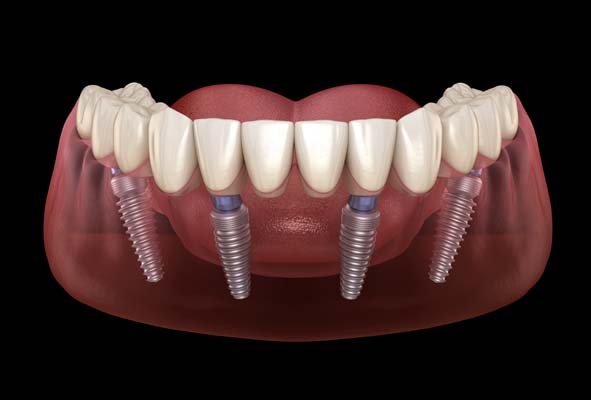What Can You Eat After Getting All-on-4 Implants?

All-on-4® is one of the many types of dental implants available. It involves the use of four specially-placed implants to support a full-mouth tooth prosthetics. After the procedure, patients often wonder what foods they can eat, especially since every step can affect recovery.
Guidelines for eating and drinking
In the next few days or weeks after the procedure, patients need to take proper precautions regarding their diet. They need to watch what they eat after getting All-on-4 implants during the first two weeks and about three months after implant placement.
Food choices during the recovery period are something to consider. Selecting the right type of food can help minimize pain or swelling. It can also help accelerate the recovery process so patients can get back to their routine. Those with preexisting dietary requirements need to consult their dietician before making adjustments to their diet.
What to eat
In the first two weeks after the treatment, patients will remain on a liquid diet. The jaw, mouth and tongue will be sore throughout this period. Although the pain or swelling may have reduced at this time, eating may still be somewhat challenging. A liquid diet will not involve chewing so as to ease the pressure on the mouth. In the first two days, cool liquids are preferable over hot or spicy liquids.
Maintaining proper hydration is also crucial. Patients should consume fluids all throughout the day. Hydration is crucial for adequate healing and quick recovery. Proper nutrition is also vital when liquids are the main diet. Patients should drink fluids containing nutrients because proper nutrition is also important for recovery.
One important note is that patients should not use straws for drinking fluids. The sucking action can break the blood clot around the implant site and cause bleeding.
The following is a list of food and drink items that can be consumed after getting All-on-4 implants: water, protein shakes, meal replacement shakes, milk, tea, coffee, frozen yogurt, smoothies, coconut water, broth, fruit juices, milkshake, ice cream, custard and vegetable or cream soup.
When making protein shakes or smoothies, the texture should be light. Chunky smoothies can make sipping difficult. As the days go by, patients will be able to tolerate thicker and heavier shakes.
In the second half of the recovery period, usually after about two weeks, the patient can switch to a soft food diet. By this time, the soreness will have diminished, and the jaw will have started healing. Patients can slowly introduce solid foods into their diet. It is still best to avoid food items that are chewy, hard and crunchy. It should be an item that can be eaten with a spoon and needs minimal chewing. Food options include soft tofu, eggs, cheese, hummus, mashed potatoes, oatmeal, soft bread, polenta and quinoa.
In conclusion
During recovery, you can use a blender to get the correct food consistency. Proper nutrition is important for healing and recovery after getting All-on-4. Focus on eating healthy foods as well.
Request an appointment here: https://hyderdentistry.com or call Shari L. Hyder, DMD at (856) 626-5047 for an appointment in our Oaklyn office.
Check out what others are saying about our dental services on Yelp: All-on-4 Dental Implants in Oaklyn, NJ.
Related Posts
All-on-4 surgery replaces all the teeth in a dental arch with fixed dentures. The dentures are held in place by four implants in the jaw. If the person is missing all their teeth, they will need to have four implants in each jaw.Getting a single dental implant is a process that requires one or more…
If you are missing all the teeth on your lower or upper jaw, you may be a good candidate for an All-on-4® system that uses four dental implants to secure a custom-fit fixed denture. It is a type of implant-supported denture that solves most of the common issues of traditional dentures. This article will outline…
Getting tooth implants is not the final phase of an implant restoration procedure. The stage is simple, but the recovery period can be uncomfortable. This part of the implant process is the time for the mouth heals and fuses to the implant post. The following guide covers what to expect during recovery and the steps…
While dental implant placement is one of the most effective ways to replace missing teeth, there are some scenarios in which these implants cannot be placed. Because dental implant placement requires surgery, there are a few general contraindications that may interfere with the procedure itself. When considering all of the tooth replacement options, it is important…
